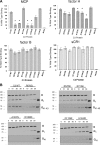Mutations in complement C3 predispose to development of atypical hemolytic uremic syndrome
- PMID: 18796626
- PMCID: PMC2597601
- DOI: 10.1182/blood-2008-01-133702
Mutations in complement C3 predispose to development of atypical hemolytic uremic syndrome
Abstract
Atypical hemolytic uremic syndrome (aHUS) is a disease of complement dysregulation. In approximately 50% of patients, mutations have been described in the genes encoding the complement regulators factor H, MCP, and factor I or the activator factor B. We report here mutations in the central component of the complement cascade, C3, in association with aHUS. We describe 9 novel C3 mutations in 14 aHUS patients with a persistently low serum C3 level. We have demonstrated that 5 of these mutations are gain-of-function and 2 are inactivating. This establishes C3 as a susceptibility factor for aHUS.
Figures


References
-
- Warwicker P, Goodship THJ, Donne RL, et al. Genetic studies into inherited and sporadic haemolytic uraemic syndrome. Kidney Int. 1998;53:836–844. - PubMed
-
- Caprioli J, Bettinaglio P, Zipfel PF, et al. The molecular basis of familial hemolytic uremic syndrome: mutation analysis of factor H gene reveals a hot spot in short consensus repeat 20. J Am Soc Nephrol. 2001;12:297–307. - PubMed
-
- Dragon-Durey MA, Fremeaux-Bacchi V, Loirat C, et al. Heterozygous and homozygous factor H deficiencies associated with hemolytic uremic syndrome or membranoproliferative glomerulonephritis: report and genetic analysis of 16 cases. J Am Soc Nephrol. 2004;15:787–795. - PubMed
Publication types
MeSH terms
Substances
Grants and funding
LinkOut - more resources
Full Text Sources
Other Literature Sources
Molecular Biology Databases
Miscellaneous

